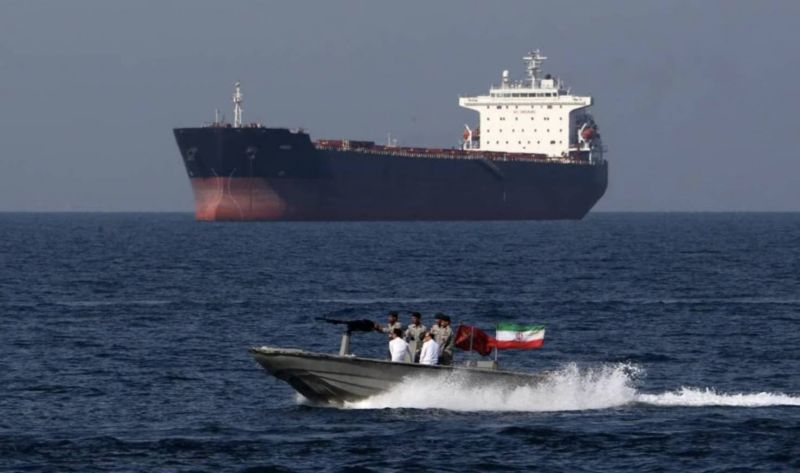
Iranian soldiers in the Strait of Hormuz in April, 2019. (Credit: AFP/archive)
The restoration of relations with Iran was expected to contribute to regional calm. Yet tensions in the Gulf have soared in recent weeks, from the renewed dispute over the al-Durra gas field, to the surprise Iranian military exercises on islands the United Arab Emirates (UAE) claims its own.
If Tehran seems to want to avoid confrontation with its neighbors, using diplomacy as a proof of goodwill, the Islamic Republic nevertheless intends to defend its positions, particularly targeting the promotion of the US and Israeli presence in the region.
Washington announced it will send additional troops, along with F-16 and F-35 fighter jets, to the Gulf waters, at a time when rumors abound about an impending Saudi-Israeli normalization.
It is in this context that the Revolutionary Guard Corps’ military drills took place Wednesday, off the coast of the Gulf islands of Abu Moussa, Grande Tomb, and Petite Tomb, which Tehran controls and Abu Dhabi claims as its own.
It was an unexpected show of force, during which Iran unveiled new vessels equipped with 600 km-range missiles, according to Tasnim news agency.
“The Persian Gulf islands are part of Iran’s honor and we will defend them,” said Revolutionary Guards Navy Commander Alireza Tangsiri. This message is implicitly directed at China and Russia; while both powers have favored the UAE by making official statements supporting bilateral talks on the islands, Iran has always closed the door to such discussions.
Following each of the statements a displeased Tehran summoned the concerned ambassador for discussions.
Washington in the crosshairs
But this warning is mainly aimed at the US, from which Abu Dhabi, despite its normalization with Iran, continues to hope for a firm response when Iranian actions put Gulf stability in jeopardy. Although repeatedly disappointed with US reactions to attacks on Aramco in September 2019 (which were attributed to Iran) and to those against Abu Dhabi and Dubai early last year, the UAE complained to Washington about Iran seizing commercial vessels recently, in particular the oil tanker which was heading toward the Fujairah port from Dubai on May 3, which jeopardizes the UAE’s reputation as a safe haven.
Faced with this increase in incidents, US army officials announced Thursday they are considering putting armed personnel on commercial ships traveling through the Strait of Hormuz. While the plan is yet to be implemented, it has received approval from senior Biden officials, a source told the Washington Post.
In response, Iran announced Saturday that it has equipped its navy with drones and ballistic missiles with a range of up to 1,000 km.
“While the recent drills are mainly a reaction to the US rise in power [in the Gulf], they are probably also a less risky alternative to the real escalation that the seizure of a US vessel could represent,” said Farzin Nadimi, a researcher at the Washington Institute.
On the evening of the drills near the disputed islands, Iran’s President Ebrahim Raisi officially invited UAE President Mohammed bin Zayed to visit Tehran.
Similarly, in the dispute over the al-Durra gas field between Iran and Saudi Arabia and Kuwait, Iran’s foreign minister sent an official invitation letter to his Kuwaiti counterpart Thursday, seemingly with the intent of easing tensions rekindled in recent weeks.
In Late June, the National Iranian Oil Company announced that it was ready to begin drilling in the Arash common field — as the Iranians call al-Durra — which Kuwait and Riyadh condemned.
Citing a bilateral agreement of March 2022, deemed “illegal” by Tehran, the two countries continue to claim exclusive rights to the disputed part of the gas field, while calling on Iran to sit at the negotiating table.
Fragile detente
“Iran and the GCC states have an interest in preserving regional de-escalation: the former because of its diplomatic isolation, the latter because of Iran’s ability to engage in military provocations and jeopardize the truce in Yemen,” said Hasan AlHasan, a researcher at the International Institute for Strategic Studies.
For the oil monarchies, attacks carried out by the Tehran-backed Houthis remain the main threat to their economic development. Admittedly, although the ceasefire agreement expired in October, a respite prevails between rebels and pro-government forces, supported since 2015 by a Riyadh-led coalition.
Following the Saudi-Iranian normalization deal signed March 10, Iran has also committed to no longer provide weapons to the Houthis, according to the Wall Street Journal, quoting Saudi and US officials.
But bilateral talks between the rebel group and the Saudi authorities have yet to yield any concrete results, while the Aden government regularly warns against potential Houthi offensives.
The Islamic Republic intends to retain its negotiating leverage, especially in view of rumors of a Saudi-Israeli normalization and a possible promotion of the anti-Iranian front in the region.
An Israeli missile attack targeted the vicinity of Damascus early Monday morning, killing six people, including four Syrian soldiers and two pro-Iranian fighters. The site targeted is a military airport around which Iranian facilities are found, according to Syrian opposition sources. It is a shadow war that could intensify in the event of normalization between Israel and Saudi Arabia, especially as discussions for a return to the 2015 Iranian nuclear deal were given up in favor of a more restrictive agreement between the US and Iran.
“Iran’s extended hand to the Gulf is more tactical than strategic,” Nadimi said. “Tehran’s foreign policy is based on a zero-sum game, where one wins at the expense of the other, and its determination to win.”
This story originally ran in French, translated by Joelle Khoury.